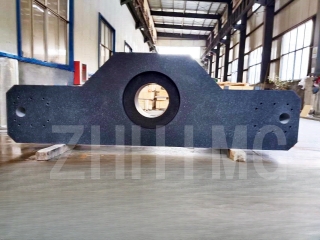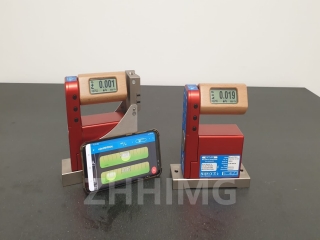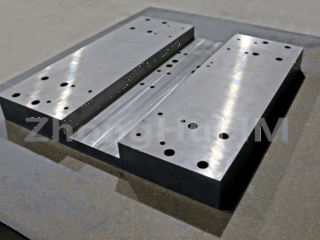In precision manufacturing, scientific research testing and other precision requirements of the field, precision static pressure air floating platform plays a pivotal role. The choice of platform base, like laying a cornerstone for the building, is directly related to the performance of the platform. Granite precision base and mineral casting base as two popular choices, each has its own advantages, the following is a detailed comparison for you.

Stability: Difference between natural crystallization and artificial composite
Granite precision base after millions of years of geological changes, the internal quartz, feldspar and other minerals crystal tight, the structure is extremely dense and uniform. In the face of external interference, such as the vibration generated by the operation of the surrounding large equipment, the granite base is like a solid shield, which can effectively block and attenuate, and can reduce the vibration amplitude of the precision static pressure air floating platform by more than 80%, providing a solid and stable foundation for the high-precision movement of the platform. In the semiconductor chip manufacturing workshop, the lithography process has high requirements for the stability of the platform, and the granite base ensures the accurate operation of the chip lithography equipment, helps the precise engraving of the chip pattern, and greatly improves the yield of chip manufacturing.
The mineral casting base is made of mineral particles mixed with special binder. Its internal structure is uniform and it has certain vibration damping characteristics. When dealing with general vibration, it can provide a relatively stable working environment for the platform. However, in the face of high intensity and continuous vibration, the vibration attenuation ability of mineral casting base is slightly insufficient compared with granite base, which may lead to slight deviation of platform movement and affect the precision of ultra-precision operation.

Accuracy retention: the balance of natural advantages and artificial control of low expansion
Granite is known for its very low coefficient of thermal expansion, generally 5-7 ×10⁻⁶/℃. In an environment of fluctuating temperature, the size of the granite precision base changes very little. In the field of astronomy, the precision static pressure air float platform for the fine tuning of the telescope lens is paired with the granite base, even if the temperature difference between day and night is significant, it can ensure that the positioning accuracy of the lens is maintained at the submicron level, helping astronomers to capture the subtle changes of distant celestial bodies.
In the formulation design of mineral casting materials, the thermal expansion characteristics can be optimized and controlled, and the coefficient of thermal expansion can be close to or even better than granite by adjusting the proportion of minerals and binders. In some temperature-sensitive, high-precision measuring equipment, the mineral cast base can maintain a stable size when the temperature changes, ensuring the accuracy of the movement of the platform. However, the mineral casting base is affected by factors such as aging of the binder, and the long-term accuracy stability needs to be further observed.
Durability: Characteristics of high hardness natural stone and fatigue resistant composite materials
Granite hardness is high, Mohs hardness can reach 6-7, with good wear resistance. In the materials science laboratory, the frequently used precision static pressure air float platform, its granite base can effectively resist long-term friction loss, compared with the ordinary base, can extend the maintenance cycle of the platform by more than 50%, reduce equipment maintenance costs, and ensure the continuity of scientific research work. However, granite material is relatively brittle and easy to break when accidentally impacted.
The mineral casting base has excellent anti-fatigue characteristics, which can effectively resist fatigue damage and maintain structural integrity during the long-term high-frequency reciprocating movement of precision static pressure air floating platform. At the same time, it has a certain resistance to general chemicals, and in the environment with a slight risk of chemical corrosion, it is more durable than granite base. However, in extreme environments such as high humidity, the binder in the mineral cast base can be affected, reducing its durability.
Manufacturing cost and processing difficulty: Natural stone challenges and artificial casting thresholds
The mining and transportation of granite raw materials are complex, and the processing requires very high equipment and technology. Because of its high hardness and brittleness, it is easy to have problems such as edge collapse and cracks in cutting, grinding, polishing and other processes, and the scrap rate is relatively high, resulting in high manufacturing costs.
The manufacturing of mineral casting base requires a specific mold and process, and the early mold development cost is high, but once the mold is formed, mass production can be achieved and the unit cost can be reduced. Its processing process is relatively easy compared with granite, and it can achieve higher precision requirements by mechanical processing means, and has cost-effective potential in large-scale application scenarios.
Post time: Apr-10-2025

